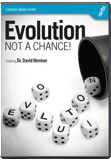
Supposed eukaryote evolution pushed back one billion years
Originally published in Journal of Creation 15, no 1 (April 2001): 4.
Abstract
Such a dramatic extension back in time for the eukaryotic cell raises even more questions for evolutionists regarding the evolution of life.
The largest gap in the fossil record is thought to be the evolution from prokaryote to eukaryote cells. Prokaryotes are cells that lack a membrane-bound nucleus and organelles, and are the types of cells that comprise bacteria and blue-green algae. Prokaryotes are complex single-celled organisms, but eukaryotes are regarded as being vastly more complex.1 Evolutionist Robert Wesson marvels:
'The more complicated nucleated (eucaryotic) cell appeared about 1.2 billion years ago. It was so long in coming that it must have been extremely unlikely, requiring several times longer than the genesis of life itself, and its advent marks the greatest known discontinuity in the sequence of living things.'2
Wesson admits that practically everything about life seems miraculous,3 but his faith in evolution remains strong, one of the most compelling 'proofs' being the remains of extinct creatures.4
Recently, the supposed evolution of eukaryotes has been pushed back to the late Archean, 2.7 billion years ago within the evolutionary/uniformitarianism timescale.5,6 The researchers did not actually find cells, but hydrocarbons derived from cellular and membrane lipids, namely steranes. These are very likely a product of eukaryotic physiology. The organic molecules were found in the slightly metamorphosed shales from the Archean Pilbara Craton of Western Australia. Most other Archean sedimentary rocks are too highly metamorphosed to preserve organic molecules. Of course, contamination was a major concern and apparently eliminated as a possibility.
Thus, the supposed evolution of eukaryotes from prokaryotes has been extended into the past a further one billion years within the evolutionary/uniformitarian timescale. Such a dramatic extension back in time for the eukaryotic cell raises even more questions for evolutionists regarding the evolution of life:
'Brocks et al. report molecular fossils that bring unprecedented clarity to the late Archean biosphere, dramatically lengthening both the geological record of eukaryotic biology and the list of questions we need to ask about early evolution.'7
This is not just another case of organisms being pushed back into the geological timescale, although it certainly is a spectacular example.8 Such a dramatic shift of one billion years means that all the previous evolutionary stories must now be rewritten. Rather than being 'extremely unlikely', this new find means that the evolution of the eukaryote cell must have been easier than first thought. But that raises a different problem for evolution: why did it take so long for the eukaryote to 'rise to ecological and taxonomic prominence'?9 Furthermore, the previously accepted stories for the timing and evolution of the Earth's atmosphere are now all wrong, because oxygen is required for sterol synthesis.9
All this illustrates the tenuous nature of these reconstructions of Archaean history.
References
-
Bergman, J., The putative evolution of the animal eukaryote cell ultrastructure, Creation Research Society Quarterly 35(4):221231, 1999.
-
Wesson, R., Beyond Natural Selection, MIT Press, Cambridge, Massachusetts, p. 57, 1991.
-
Wesson, Ref. 2, p. 59.
-
Wesson, Ref. 2, p. 38.
-
Brocks, J.J., Logan, G.A., Buick, R. and Summons, R.E., Archean molecular fossils and the early rise of eukaryotes, Science 285:10331036, 1999.
-
Knoll, A.H., A new molecular window on early life, Science 285:10251026, 1999.
-
Knoll, Ref. 6, p. 1025.
-
Oard, M.J., Evolution pushed further into the past, CEN Tech. J. 10(2):171172, 1996.
-
Knoll, Ref. 6, p. 1026.
Recommended Resources

Answers in Genesis is an apologetics ministry, dedicated to helping Christians defend their faith and proclaim the good news of Jesus Christ.
- Customer Service 800.778.3390
- © 2025 Answers in Genesis




